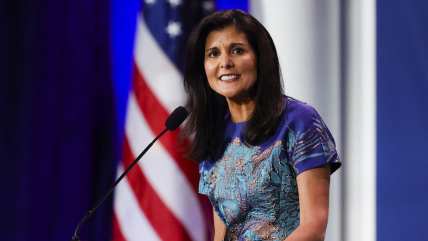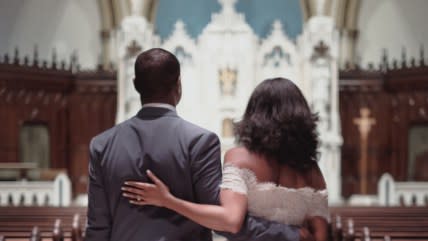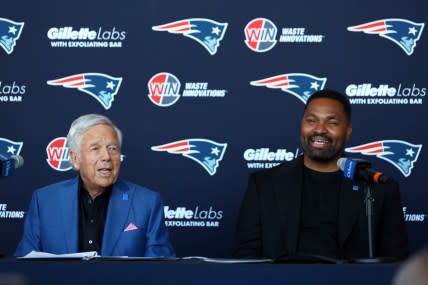Keeping the faith in a presidential election: Does it only take a song and dance to get the Black vote?
As Black voters prepare for another presidential election showdown, it’s time we ask more of those we allow into our pulpits.
“Notes on faith” is theGrio’s inspirational, interdenominational series featuring Black thought leaders across faiths.
Sometimes, all it takes is for our political leaders to sing like us, play an instrument like us, eat like us, or do anything even mildly referencing our culture, and they get our vote — and a free pass to the cookout.
At least, that’s what seems to be the standard when politicians visit our faith communities at pivotal times to engage with our “Black church” culture. Hear us out: We know we are in full campaign swing when politicians show up to Black spaces and pull out a Negro spiritual or congregational song that completely hijacks our religiocultural wiring. Many of us fall for it; we participate by screaming and shouting in response or planking our bodies without any physical resistance. With our affirmations and acquiescence, we often give these visitors an “A” for effort without making them actually work for our benefit.
In those moments, we forget that participation in our culture should not be easily accessible. We ignore that we have experienced the most wealth extraction through others’ performance of our culture.
Take, for instance, President Joe Biden’s recent visit to Charleston, South Carolina, to commemorate the 2015 massacre of nine members of the historic Mother Emanuel AME Church. During his speech, Biden recited the lyrics of the classic gospel song, “I Don’t Feel No Ways Tired” (1978) by James Cleveland — ostensibly a reference to longstanding concerns voiced about the incumbent president’s age. Saying the words from our song of endurance independent of its iconic pulse and traditional flavor, the people of God audibly affirmed the president in front of the media present.
Biden is by no means the only politician to have done something like this to connect with a primarily Black audience. Former presidential candidate Hillary Clinton used the same Cleveland song in 2007, a play parallel with her husband’s pre-presidential 1992 appearance on “The Arsenio Hall Show,” where he famously played the saxophone. While far closer to the culture as a Black Christian, even as former President Barack Obama sang “Amazing Grace” while eulogizing one of the Emanuel 9 during his second presidential run, the irony was lost that the song’s lyrics were written by a former enslaver reflecting on his own salvation, not that of those he enslaved.
We can go through a litany of the songs and figurative dances politicians have gone through to engage and distract us when in our company, but no matter how one feels about what is sometimes tantamount to a gimmick, it is a reminder for us to keep the main thing the main thing. Cynical as it may seem, no matter who might be allowed to ascend the dais, we cannot conflate their love of the culture with their love of the people.
We must demand answers about what their strategies are for our communities.
How might we reconceptualize the function of our houses of worship when politicians seek to leverage them for an appearance?
As a matter of holy protocol, we must require their direct engagement with our communities’ missions in order to have any chance of gaining access to our pulpits or podiums. What is their strategic plan?
With former President Donald Trump’s recent win during the Iowa Republican caucus and Biden in full campaign mode, the 2024 campaign season is in full swing. Understandably, there are a lot of anxieties around who will win — and, for many in our communities, maybe more anxiety about one candidate over the other as the two-party system continues to hold fast to our electoral process. The anxiety is real — and valid.
There is also understandable fatigue that accompanies this election season and the prospect of a face-off we have seen before. With billions of dollars donated and used, we brace for the stream of commercials on television, the social media ads, and the talking heads on the news. We inevitably expect to see politicians show up in our churches and other places of worship. Whether we sense they are patronizing us or not, there is fatigue in knowing some pastors will offer an enthusiastic and unearned endorsement, speaking about how much regard these candidates have for our communities. We can debate the sincerity of these appearances, but can we agree that when it seems politicians only show up during election season, it can also seem a bit disingenuous?
Recommended Stories
America continues to gaslight Black people about racism
70 organizations, NAACP included, ask Biden’s Education Dept. to retool student debt plan to help people of color
Learning to walk alongside a leading lady: Refining my faith as a recovering misogynist
Rev. Calvin Taylor Skinner
Don’t hate the playa, change the game: Did Katt Williams offer a resolution for a new era?
Rev. Dr. Alisha Lola Jones and Rev. Calvin Taylor Skinner
What does Watch Night mean for Black Americans today? It dates back to the Emancipation Proclamation
A ‘colorblind’ society upholds white supremacy
‘She needs those racist votes:’ Nikki Haley’s gaffe exposes Republican Party’s race problem
Even as electoral politics leave many of us disillusioned, we cannot lose hope. Our hope is rooted in faith. Our faith guides us towards what is right, plainly in Micah 6:8 (NRSV): “He has told you, O mortal, what is good; and what does the LORD require of you but to do justice, and to love kindness, and to walk humbly with your God?”
With elections for congressional, state and local offices on the agenda this year, we cannot neglect our duties. Every level of this government calls for our strategic, unapologetic attention. Now is not the time to be lukewarm about what it takes to love our people — which is, in this context, to act and advocate on our behalf. Singing and jamming on the one ain’t hitting it, Saints.
As Rev. Dr. Martin Luther King Jr. said, “There comes a time when one must take a position that is neither safe, nor political, nor popular, but he must take it because conscience tells him it is right.”
With all that is happening in the world, we understand the anxieties many of our people are experiencing. Globally, if it’s not one thing, it’s another; conflicts and genocides are occurring concurrently, as are environmental crises. Communities nationwide face economic hardships as the cost of living drastically increases. Families are feeling crushed as costs for groceries, housing and utilities are on the rise while wage rates stay stagnant, and access to quality health care and life-saving medications too often continues to be a life-and-death decision. With the realities within our communities, including the despair created by the school-to-prison nexus and seemingly little to no progress in calls for reparations for the enduring harms caused by our ancestors being taken hostage for slavery, one would be well within reason to ask: Is there any hope?
We emphatically say — Yes!
Where are those willing to do what is right, no matter the costs? There is a moral ground we must rise to stand on, and our future generations depend upon it. Our present calls for it, and our ancestors have laid the roadmap. It speaks to a “promised land” we can embrace, even in this age. This promised land requires equity and justice. It necessitates an unashamed unity of our people. This promised land obliges action that is intergenerational and bold.
Searching for sage advice about the intersection of politics and faith, an insight emerged from The Honorable Louis Farrakhan during the 2006 State of the Black Union. Speaking on a panel of faith, business and civic leaders — including Revs. Al Sharpton and Joseph Lowery, and Bishop Eddie Long, among others — Farrakhan expressed concerns that persist 18 years later.
Juxtaposing the promised land told to Moses as conveyed in the sacred text and the one King preached in his last sermon, Farrakhan challenged and encouraged listeners to be clear about conflating being empowered with being power-adjacent:
“Most of us who have access, who have wealth, who have quote-unquote positions, we are like mannequins in the shopping mall of democracy. When you go to the shopping mall, you see [what] the mannequin is dressed in [and] what you would like to buy. [But] the mannequin can’t talk; the mannequin can’t walk,” he noted
“We have got Black people in power, but they don’t have powers. We have Black people with money that we think are giants, but in the company of their white counterparts, they are midgets. If we want to get where we want to go, we can’t focus on the house that has rejected us and our fathers for 400 years. We have to focus on ourselves.”
The promised land is a destination built on bright hope for today and faith for tomorrow — but is faith alone enough? Well, we need to be clear on what faith is. If it is just a passive faith with no sense of urgency, we say, “Nah.” When it comes to addressing the issues, we must address them with the same urgency as we do the spiritual — or is that the dilemma? Not to cast aspersions, but is the spiritual health of our churches so anemic that our capacity to discern for ourselves — to address the sociopolitical crises in our midst with urgency — becomes impotent? We need to be honest in our assessment of where we are to determine how best to move forward.
We can be steadfast about our collective power and bold in accessing the divine power within. For those who will heed this call, that divine power has uniquely placed us as the moral conscience of the nation and world. We have great riches because of our time-honored understanding of our ties to this land and to the universe; let us be grounded in that knowledge and go boldly from there. Our destiny is tied together as a people, and our ancestors’ blueprint shall guide us — let us build on that legacy and go boldly from here to the promised land.
However, understand this: we can only attain that promised land when we ignore the music and dance that beguiles us and keep our eyes on the prize of strategic planning and unity. That prize is sealed through the covenant that embraces the faith that should we act, God has got us! Don’t lose hope through all of this; God’s got us!

Rev. Dr. Alisha Lola Jones is a faith leader helping people to find their groove in a fast-paced world, as a consultant for various arts and faith organizations and professor of music in contemporary societies at the University of Cambridge in Cambridge, England. She is an award-winning author of Flaming? The Peculiar Theopolitics of Fire and Desire in Black Male Gospel Performance (Oxford University Press). For more information, please visit DrAlisha.com.
Rev. Calvin Taylor Skinner is dedicated to empowering frontline communities in Knoxville, Tenn. and the United Kingdom. He uses faith and policy to address energy justice, criminal justice reform, voter education/mobilization, electoral politics, and global affairs. Along with his wife, Rev. Dr. Alisha Lola Jones, they lead InSight Initiative, a consulting firm focusing on capacity building and live events production.
Never miss a beat: Get our daily stories straight to your inbox with theGrio’s newsletter.
The post Keeping the faith in a presidential election: Does it only take a song and dance to get the Black vote? appeared first on TheGrio.







